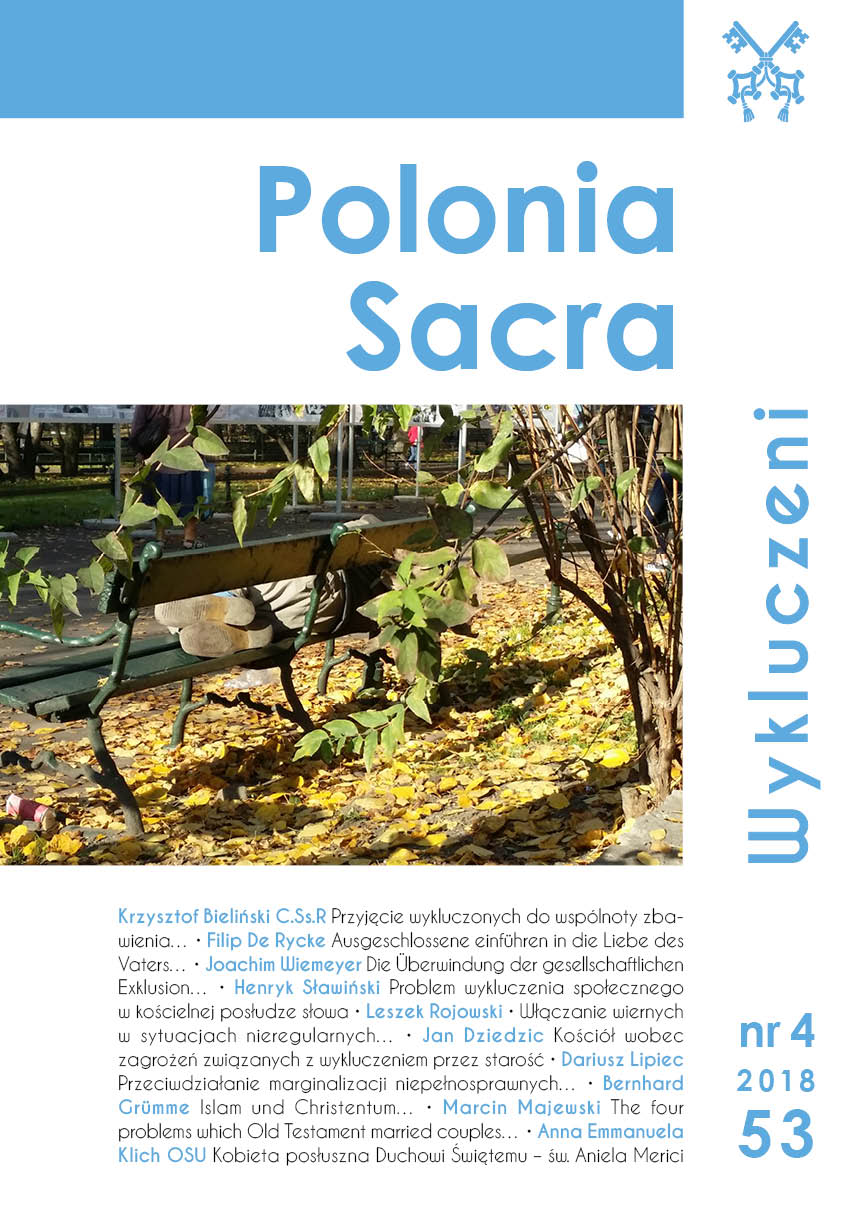The Four Problems which Old Testament Married Couples Grapple with
DOI:
https://doi.org/10.15633/ps.2636Słowa kluczowe:
Stary Testament, małżeństwo, poligamia, brak potomstwa, zdrada, rozwódAbstrakt
W kontekście żywo dyskutowanej encykliki papieża Franciszka o małżeństwie Amoris laetitia w artykule podejmuję cztery najistotniejsze problemy, z jakim borykały się małżeństwa w Starym Testamencie: poligamia, brak potomstwa, niewierność czy zdrada oraz rozwód. Właśnie w tym kontekście ukazuje się w pełni specyfika katolickiego nauczania o matrymonium. Proponowana teza mówi, że problemy dotykające małżonków opisanych na kartach Biblii nie są odległe od tych, z którymi mierzą się dzisiejsze pary.
Bibliografia
Bielecki S., Stary Testament o małżeństwie. Ideał i rzeczywistość, “Kieleckie Studia Teologiczne” 2 (2003), p. 83–101.
Burnside J. P., Strange Flesh: Sex, Semiotics and the Construction of Deviancy in Biblical Law, “Journal for the Study of the Old Testament” 30 (2006), p. 387–420.
Marriage and Family in the Biblical World, ed. K. M. Campbell, Downers Grove 2003.
Drinkard J. F., An Understanding of Family in the Old Testament. Maybe not as Different from Us as We Usually Think, “Review and Expositor” 98 (2001), p. 485–501.
Eskenazi T., Out from the Shadows: Biblical Women in the Postexilic Era, “Journal for the Study of the Old Testament” 54 (1992), p. 25–43.
Friedl C., Polygynie in Mesopotamien und Israel: Sozialgeschichtliche Analyse polygamer Beziehungen anhand rechtlicher Texts aus dem 2. und 1. Jahrtausend v. Chr., Munster 2000.
Gross W., Die Gottebenbildlichkeit des Menschen nach Gen 1, 26.27 in der Diskussion des letzten Jahrzehnts, “Biblische Notizen” 68 (1993), p. 35–48.
Jackson B. S., The “Institutions” of Marriage and Divorce in the Hebrew Bible, “Journal of Semitic Studies” 56 (2011), p. 221–251.
Jacobus H. R., Slave Wives and Transgressive Unions in Biblical and Ancient Near Eastern Laws and Literature, in: “Leviticus and Numbers”, ed. A. Brenner, A. Chi Chung Lee, Minneapolis 2013, p. 55–75.
Kiernikowski Z., Dwoje jednym ciałem w Chrystusie, Warszawa 2000.
Kowalski M., Powołani do życia w pokoju (1 Kor 7, 15). Lektura socjoretoryczna „przywileju Pawłowego” w 1 Kor 7, 12–16, “Verbum Vitae 30 (2016), p. 121–152.
Kraeling E. G., The Brooklyn Museum Aramaic Papyri: New Documents of the Fifth Century B.C. from the Jewish Colony at Elephantine, New Haven 1969.
Kroeger C. C., The Biblical Option of Divorce, “Priscilla Papers” 13 (1999), p. 17–18.
Lemos T. M., Marriage Gifts and Social Change in Ancient Palestine, 1200 BCE to 200 CE, Cambridge 2010.
Levine E., Marital Relations in Ancient Judaism, Wiesbaden 2009.
Meyers C., Rediscovering Eve: Ancient Israelite Women in Context, New York 2013.
Morrow A. R., I Hate My Spouse: The Performative Act of Divorce in Elephantine Aramaic, “Journal of Northwest Semitic Languages” 43 (2017), p. 7–25.
Otto E., Deuteronomium 12, 1 – 23, 15 (vol. 1) and Deuteronomium 23, 16 – 34, 12 (vol. 2), Freiburg 2016.
Dom – rodzina – małżeństwo, red. J. J. Pawlik, Olsztyn 2013.
Salzman T. A., Lawler M. G., The Sexual Person: Towards a Renewed Catholic Anthropology, Washington 2008.
Schüle A., Die Urgeschichte (Genesis 1–11) (Zürcher Bibelkommentare AT 1/1), Zurich 2009.
Shectman S., What Do We Know about Marriage in Ancient Israel?, in: Reading a Tendentious Bible: Essays in Honor of Robert B. Coote, ed. M. L. Chaney, U. Y. Kim, A. Schellenberg, Sheffield 2014, p. 167–176.
Shectman S., Rachel, Leah, and the Composition of Genesis, in: The Pentateuch: International Perspectives on Current Research, ed. T. B. Dozeman, K. Schmid, B. J. Schwartz, Tübingen 2011, p. 207–222.
White K., The Legal Status of Barren Wives in the Ancient Near East, “Priscilla Papers” 28 (2014), p. 18–22.
Pobrania
Opublikowane
Numer
Dział
Licencja
Autorzy publikujący w czasopiśmie udzielają jego wydawcy zgody o następującej treści:
- Autor zachowuje autorskie prawa majątkowe do utworu, a jednocześnie udziela wydawcy czasopisma zgody na jego pierwszą publikację w wersji drukowanej i wersji online na licencji Creative Commons Uznanie autorstwa 4.0 Międzynarodowe oraz zgody na wykonywanie opracowań, w tym przekładów.
- Autor ma możliwość udzielania zgody niewyłącznej na opublikowanie utworu w wersji, która ukazała się w czasopiśmie (np. zamieszczenia go w repozytorium instytucjonalnym lub opublikowania w książce), wraz z informacją o jego pierwszej publikacji w czasopiśmie.
- Autor może umieścić swój utwór online (np. w repozytorium instytucjonalnym lub na swojej stronie internetowej) jeszcze przed zgłoszeniem utworu do czasopisma.

